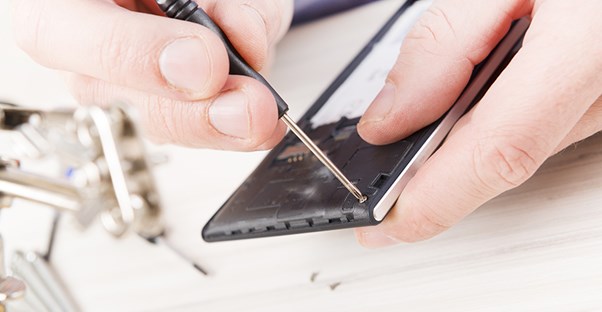Repair vs. Replace: What to Do With a Broken Cell Phone

Our cell phones are how we stay connected to the rest of the world. If your phone breaks, you may feel cut off and want to reestablish your connection as soon as possible. Your options include repairing or replacing your phone, but which is the better choice? Here is a quick look at the pros and cons of each option.
Repairing Your Phone
Simply paying to fix your phone may be the simplest and cheapest way to get your phone back into working condition. Usually repairing your phone is the easiest if the fix is minor, such as a crack in your screen or sticky buttons. All you will have to do is find a repair shop that offers fair prices and security for their work. Here is a quick look at the pros and cons of repair.
What are the pros of repairing?
- Cheap: It may be difficult to see the savings, especially since most repairs cost over $100, but for a phone that costs close to $600, simple repairs are usually much cheaper than replacing the phone. For example, the average iPhone 6 repair costs around $176, which is much less than the full price of the phone.
- Familiarity: You will get to keep the phone you have now and are used to, so you won’t have to worry about learning how to use a new gadget.
- Convenience: Many phone repair shops are able to perform your repair while you wait. The average repair normally only takes about ten minutes, especially if the repair is a simple one such as replacing the battery or screen, making this a quick and easy option.
What are the cons of repairing?
- Risky: Repairing your phone at a disreputable repair shop could potentially lead to more damage to your phone. An easy way to avoid this is to compare prices at different places for your needed repair. If the repair costs $85 everywhere else, but one shop is going to charge $45, then this is a red flag that they may be using low-quality parts that will lead to further damage in the future.
- Voided warranty: Usually if you have repairs performed on a broken phone, this will void your warranty for any future damage. Check to see if the problem is covered by the warranty before taking any other steps to fix your phone on your own.
- Waiting for parts: If a repair shop needs to order parts for your phone then your wait will be extended by weeks. If you have a common phone like an iPhone, this typically won’t be a problem, but for Androids or uncommon models you may be faced with a wait.
Replacing Your Phone
A new phone is an attractive option when things are going wrong with your current phone. Often, replacing your phone will actually be an upgrade. Here is a breakdown of the pros and cons of replacing your broken phone.
What are the pros of replacing?
- Brand new device: You get a factory-fresh phone, completely up to date and with a brand new manufacturer’s warranty.
- Discounts: Your phone carrier may offer special promotions which allow you to purchase the newest models of phones for reduced prices.
- Upgrades: Often, phones will upgrade parts between models. This means replacing your phone results in an overall better phone in general that is less likely to break again in the future.
What are the cons of replacing?
- Cost: Replacing your phone will almost always cost more than repairing. Take a look at the full price of phone options before replacing.
- Hidden fees: Getting a new phone before your phone contract is complete may result in extra fees attached.
- Add-ons: If you had a phone case and other accessories for your current phone, you will most likely need to buy new ones for your replacement phone.






